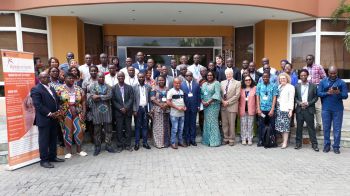Sussex research sheds light on the complexity behind migration in West Africa
By: Stephanie Allen
Last updated: Monday, 2 September 2019

Members of the Sussex-based Migrating out of Poverty Research Programme Consortium took part in a two-day workshop in Ghana last week to share findings following nine years of research with partners from around the world.
The Migrating out of Poverty Research Programme Consortium is funded by the UK's Department for International Development (DFID) and focuses on the relationship between regional migration, internal migration and poverty in Africa and Asia.
With the consortium coming to a close at the end of September, the workshop, organised by the Centre for Migration Studies at the University of Ghana, brought colleagues and partners together from West Africa and beyond to discuss various research findings.
Professor Priya Deshingkar, Principal Investigator of Migrating out of Poverty, University of Sussex, said: “The goal of Migrating out of Poverty was to maximise the poverty reducing and developmental impacts of migration, and to minimise the costs and risks of migration.
“Although migration does not necessarily lead to positive outcomes, the consortium has worked to produce research which sheds light on the circumstances in which migration can reduce poverty.
“We’ve also helped to dispel some of the myths that surround migration, particularly in Africa.
“For example discourses around migrant smuggling and human trafficking often portray migrants as playing a passive role in setting their own migratory agenda, but we found migrants to sometimes be active participants in the decision-making process.”
Professor Mariama Awumbila of the Centre for Migration Studies (CMS), University of Ghana, added: “While Western media images and political narratives tend to suggest an exodus of Africans to Europe, we found that the majority of migrants from Ghana actually moved to destinations within Ghana and the West Africa sub region.
“These learnings are critical when it comes to developing effective policy responses to migration.”
Professor Deshingkar was joined in Ghana by Professor of Economics L. Alan Winters, Senior Lecturer in Economics Julie Litchfield, Project Manager for Migrating out of Poverty Allison Baldasare and communications specialist at the Institute for Development Studies, James Andrews.
While there, the team highlighted the work of the consortium, which focuses on three key themes: gender and generation, migration industry and income and remittances.
They discussed several policy briefs including:
- The costs of (ir)regular migration – providing insights into the costs and benefits of (ir)regular male migration from the perspective of both parents and wives.
- Navigating complex social relations – examining the flow of low-skilled migrants who are assisted by brokers and smugglers along two corridors – from Ghana towards Libya and Europe, and from Ghana towards the Gulf States – for work in domestic and construction sectors.
- Migrant smuggling in the Casamance area of Senegal - focusing on the diversification both of routes and of the ethnicities of Senegalese migrants, in response to the changing policy context and the emergence of a more established migration industry. It argues that the criminalisation of migrant smuggling has not succeeded in eliminating the practice.
- Changing patterns in migration and remittances - drawing attention to the contested views on the effect of migration with respect to the welfare of migrant households and the socioeconomic development in migrant-sending areas.
The two day workshop also saw attendees participate in a field trip to visit migrant helping programmes in some of the poorest areas of Accra, home to many migrants, in Ghana.
Allison Baldasare, Programme Manager of Migrating out of Poverty, said: “The workshop in Ghana was a brilliant opportunity to share the work that has been done within the consortium over the last nine years, and help policy makers and research partners look ahead to what needs to change in terms of discourse and policy.”
The group's research findings in Ghana have already influenced the formulation of Ghana's Nationam Migration Policy and ongoing discussions on the new Labour Policy and Diaspora Engagement policies. CMS are now advising other African governments in the region and Southern Africa on ways of incorporating internal migration into their national development plans.
For more information on the programme, please contact migratingoutofpoverty@sussex.ac.uk
